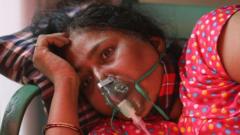The US government's decision to cut $500 million in funding for mRNA vaccines, led by Health Secretary Robert F. Kennedy Jr., has sparked a debate on the implications for public health and vaccine technology. Experts criticize the move as potentially misguided, emphasizing mRNA vaccines' significant achievements during the pandemic and urging continued investment in their development alongside other vaccine approaches.
The Risks of Reducing Investment in mRNA Vaccine Research: A Critical Analysis

The Risks of Reducing Investment in mRNA Vaccine Research: A Critical Analysis
Robert F. Kennedy Jr.'s recent decision to withdraw funding for mRNA vaccine projects raises important questions about vaccine efficacy, safety, and research diversification.
Kennedy's recent announcement to pull $500 million in funding intended for mRNA vaccine research has ignited a fierce debate regarding its implications for public health, vaccine technology, and the future of disease prevention methodologies. This funding was allocated for 22 projects focusing on using mRNA to combat infectious diseases such as COVID-19 and influenza. While Kennedy, a noted vaccine skeptic, argues for a pivot towards "safer, broader vaccine platforms," experts are weighing in on whether this move could prove detrimental to ongoing advancements in vaccine technologies.
Critics, including esteemed vaccine researcher Prof. Adam Finn from the University of Bristol, caution that abandoning mRNA technology could constitute a "catastrophic error." Finn acknowledges Kennedy's concerns about the purported limitations of mRNA vaccines in combating upper respiratory infections, but vehemently argues that the technology demonstrates substantial benefits, highlighting its unmatched speed and efficiency compared to traditional vaccine methods.
Kennedy asserts that data indicates mRNA vaccines have failed to effectively guard against infections like COVID-19 and influenza, advocating for alternative platforms. However, conversations among vaccine experts reveal significant opposition to this assertion. Prof. Andrew Pollard, for instance, refutes claims regarding the lack of efficacy and notes that mRNA vaccines have indeed saved millions of lives during the pandemic and provided substantial protection as confirmed by rigorous clinical trials.
The ongoing challenge, experts suggest, stems from the mutable nature of certain viruses, like influenza, that necessitates continual vaccine updates, rather than inherent flaws in mRNA technology itself. As scientists delve deeper into vaccine effectiveness across various platforms, they underscore the importance of not dismissing any one method entirely.
Kennedy's sweeping withdrawal raises further concerns about the implications on the global stage and possibilities for future pandemics. Some argue that this drastic reduction in mRNA funding could lead to an underpreparedness for potential viral outbreaks. Experts warn that as the U.S. steps back from mRNA research, it may undermine public trust in vaccines and hinder advancements in mRNA applications for other medical challenges, including cancer treatment.
Ultimately, the separation from mRNA research can carry significant ramifications for America's standing in global medical research, as well as the ongoing quest for effective vaccination strategies. As the debate unfolds, prioritizing an objective and comprehensive perspective on vaccine technologies—including mRNA—remains paramount in navigating the complexities of future healthcare challenges.





















